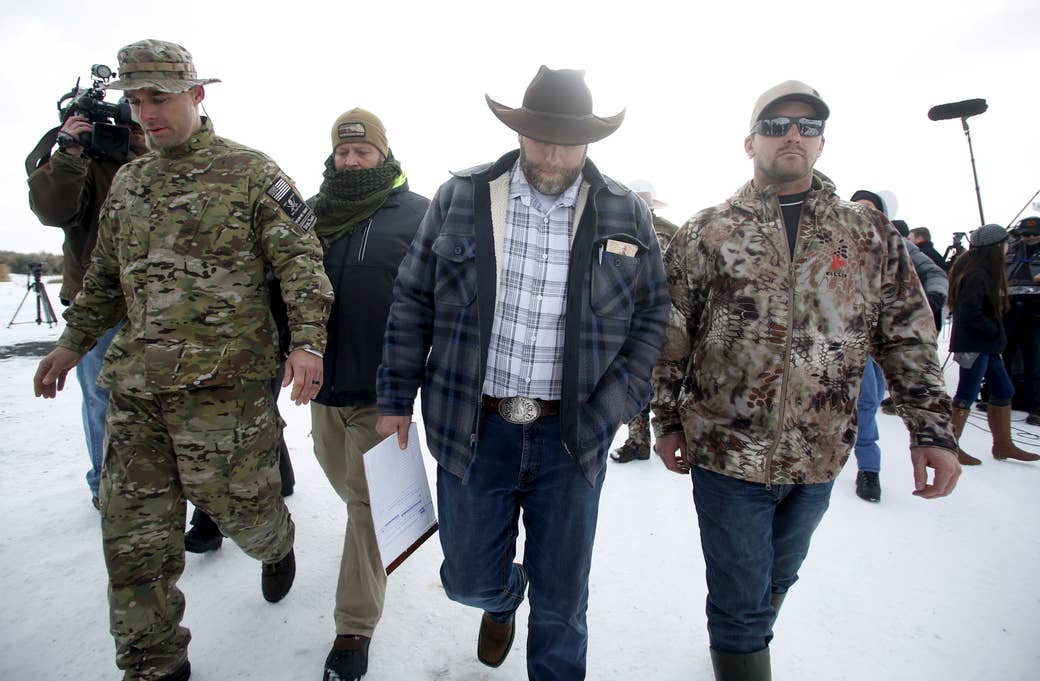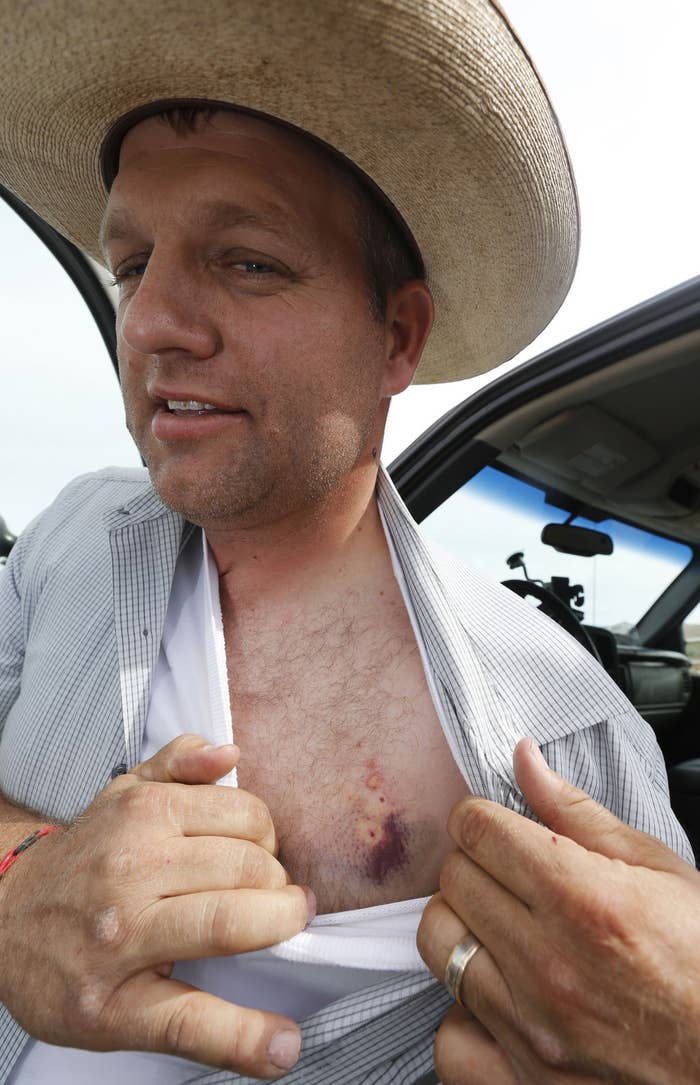
Ammon Bundy, clad in the attire of a 19th-century frontiersman, stepped up to a soapbox in Minneapolis, and began fervently preaching to a crowd of onlookers.
It was 1997, and "Elder" Bundy was a 21-year-old missionary for the Church of Jesus Christ of Latter-day Saints, which was celebrating the 150th anniversary of Mormon pioneers arriving in Salt Lake Valley. Local members in Minnesota donned costumes and pushed handcarts, and missionaries were invited to re-enact the town-square sermonizing that had once been popular among religious proselytizers. Some of the shyer elders demurred — but not Bundy.
"He was totally fearless. Definitely a leader," recalled one former missionary who served with Bundy. "When he decides to dig in on something because he thinks it's got some kind of a higher purpose, he's not gonna back down."
Widely admired by peers at the time for his boldness and work ethic, Bundy spent several months serving as an assistant to the mission president (the highest position a young elder can hold) before eventually returning to his family's rural hometown in Nevada, and losing touch with most of his fellow missionaries.
The next time they saw him, nearly two decades later, Bundy was on the news showing off his taser wounds amid a tense, high-profile standoff with the federal government over land rights. It was the spring of 2014, the beginning of a turbulent ascent that would soon turn him into a polarizing folk hero of the far right — and, increasingly, an embarrassment to his church.

On Monday, the Mormon Church released a statement condemning Bundy's militia for seizing control of a federal wildlife refuge in Oregon, where the group is refusing to leave unless the government meets its demands. "This armed occupation can in no way be justified on a scriptural basis," the church's statement read, adding that conflicts should "be settled using peaceful means, according to the laws of the land."
But the militia showed no signs of standing down in the fourth day of the standoff — and in the meantime their rhetoric has been rife with references to LDS theology. One of the occupiers has identified himself to media only as "Captain Moroni," a hero of the Book of Mormon, and Bundy himself said he was prompted to take up arms after receiving divine revelation that "the Lord was not pleased" with the injustices faced by ranchers in Oregon.
The public split between the church and the Bundy militia highlights an increasingly deep cultural and political divide that runs through much of contemporary Mormonism. On one side of this rift is the religion's mainstream majority, heavenbent on assimilating and thriving in American life; on the other is a narrower swath of doomsday "preppers," Glenn Beckian gold hoarders, and fiercely anti-government libertarians whose more radical tendencies harken back to the faith's founding.
If Mitt Romney — with his wholesome family, unfailing good manners, and impressive career — stands as the embodiment of Mormonism's modern ideal, perhaps the rugged, rowdy Bundys offer a glimpse at an historical counterfactual; a vision of what the church would look like today if the early pioneers that were chased into the desert never ventured back to America.
The growing political gulf between these two factions of Mormonism is on vivid display in the Bundys' home state of Nevada — a key battleground in the 2016 Republican primary contest where candidates are already navigating the topography of the LDS landscape as they court the state's disproportionately influential Mormon vote. (Though Latter-day Saints make up just 5% of the state's population, they have comprised roughly 25% of GOP caucus voters in the last two presidential elections thanks to Romney.)
"It makes me literally cringe when I hear the media report that some of these people are LDS," said David Hall, a Mormon from Nevada, adding that when Bundy and his followers publicly suggest their actions are supported by church doctrine, "such statements border on apostasy."
He's not alone in his embarrassment. In recent days, Mormons have been circulating a tongue-in-cheek hashtag on Twitter responding to reports about the Bundys' faith: #NotAllMormons. (An even more obscure inside joke, #NotAllAmmons, refers to Bundy's first name, which is taken from a popular figure in the Book of Mormon, and which many Mormon men share.)
Aggressively perception-conscious and concerned with fitting in, the church has spent decades working to cultivate an image of wholesomeness, hard work, patriotism, and normalcy — and its members tend to pattern their lives around this ideal. They go to dental school, or become CPAs. They start small businesses and big families. They drive their kids to Cub Scouts on Wednesday nights, and send cheerful Christmas cards to their suburban neighbors.
Todd Craney, who worked as deputy political director for Mitt Romney's 2012 campaign, said the the typical Mormon caucus-goer in Nevada may sympathize with the Bundys on the federal land use issue — a hot-button debate throughout the American west — but is likely to find their civil disobedience alarming.
"Mormon Republican voters in my experience are largely mainstream conservatives who are civic-minded Mitt Romney voters that don't subscribe to the extreme tactics of a very small faction," said Craney.
"Nevada Mormons spend quite a bit of time trying to blend in," said one Nevada Mormon who, perhaps fittingly, asked to remain anonymous. He added, "If a presidential candidate came out and backed the Bundys, they would probably lose a lot more Mormon votes than they would gain."
Among voters like these in Nevada, Marco Rubio — who spent part of his childhood as a Mormon living in Las Vegas — appears to have the inside track.
But the Bundys' brand of Mormonism is not without its adherents. As BuzzFeed News' Jim Dalrymple wrote, the church has a long history of conflict with the federal government that dates back to its earliest days, when founding prophet Joseph Smith organized a Mormon militia to protect the community from aggressors. While LDS doctrine holds that the United States is a modern Promised Land — and its Constitution a divinely inspired document — the religion's culture also has a deeply ingrained suspicion of federal power.
Cleon Skousen, a well-known anti-communist, conspiracy theorist, and Mormon theologian, was emblematic of this tradition in the 1970s and '80s. More recently, it has been embodied by Glenn Beck, a Mormon convert and Skousen devotee. As Mormonism continues to expand globally — with church leaders focused on promoting and projecting an image of diversity — the politics of America's hard right have gradually become disentangled from Mormon culture. Latter-day Saints are still overwhelmingly Republican, but while their views on certain social issues may lag behind popular opinion, most tend to stay away from political fringes. Indeed, the overarching story of Mormon history is one of de-radicalization.
Still, libertarian strains remain in the faith. In 2012, while the vast majority of LDS caucusgoers flocked to Romney, a small but energetic grassroots movement of "Mormons for Ron Paul" fanned out across the state's far-flung rural precincts to organize supporters. (The Bundys were Paul donors.)
This year, Rand Paul has been working to expand his father's inroads to the state's Mormon community, while Ted Cruz and Donald Trump also contend for that segment of caucusgoers.
Connor Boyack, a Mormon who helped organize Ron Paul voters in 2012 and the author of the book Latter-day Liberty, said the the libertarians in his faith differ with the mainstream Republicans "culturally, intellectually, politically, and even doctrinally."
"Romney-type Mormons are generally content to ingratiate themselves with the establishment in pursuit of power and maintaining the status quo," said Boyack. "Mormons who sympathize with the Bundys are far more likely to support agitation and confrontation against this establishment, which they believe is responsible for such sharp deviations from the U.S. Constitution."
Mormon children are taught from a young age to memorize and recite the church's 13 official "articles of faith," one of which reads, "We believe in being subject to kings, presidents, rulers, and magistrates, in obeying, honoring, and sustaining the law." "Romney-type" Mormons have pointed to this verse in recent days to condemn the Bundys' actions, but Boyack rejects the theological premise of the argument.
He said that as long as it can be shown that political leaders are not "sustaining the law," then "the door is opened for withdrawing support and pursuing other avenues to effect change."
That's the kind of provocative argument that's liable to spark a spirited debate in Sunday School class — but it's unlikely to sway many Mormon voters, let alone the outcome of the Nevada caucuses. So far, none of the Republican candidates have lent public support to the Bundys' tactics, and there's a political reason.
As Chris Henrichsen, a Mormon political scientist from Nevada, wrote this week, "Even my friends that now support Ted Cruz in the 2016 presidential race have no sympathy for the Ammon Bundy-led actions this weekend."
CORRECTION
1997 was the 150th anniversary of Mormon pioneers arriving in Salt Lake City, not the founding of the church. A previous version of this story misstated what that anniversary signified.
